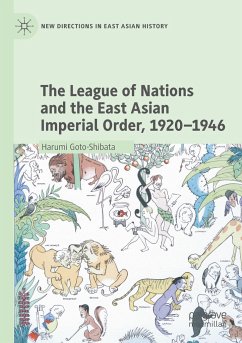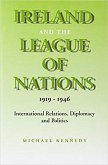Well-grounded on abundant Japanese language sources which have been underused, this book uncovers the League of Nations' works in East Asia in the inter-war period. By researching the field of social and other technical issues, namely, the trade in narcotics, the trafficking of women and the work in terms of improving health provision and providing economic advice to Nationalist China, it not only examines their long-term impacts on the international relations in the region but also argues that the League's works challenged the existing imperial order of East and Southeast Asia. The book offers a key read for academics and students of international history and international relations, and others studying Japan or East Asia in the twentieth century.
"The book is a valuable contribution to the knowledge of the League's work, especially in China, which offers historians many valuable insights and starting points for further research. ... the book outlines some of the origins of China's operations in international organizations, evolving from a semi-colonial recipient of international aid to one of the world's most powerful states, aspiring to be a leader in global multilateral politics in the twenty-first century." (Thomas Gidney, H-Soz-Kult, hsozkult.de, November 2, 2022)
"This is a meticulously researched work based largely on primary archival sources. The use of sources ... presents the perspective of governmental and League actors. In doing so, Goto-Shibata shows not only the immense influence that Western powers ... had on the League's technical work in Asia but also the sympathy of League officials towards the countries they operated in. ... the book is a valuable contribution to the knowledge of the League's work, especially in China, which offers historians many valuable insights and starting points for further research." (Thomas Gidney, Connections, October 28, 2022)
"Harumi Goto-Shibata is ... interested in the practices and the actors constituting the fabric of international order, including the work of international civil servants, cooperation with national authorities, and the importance of conferences and forums. ... Goto-Shibata focuses on how the League of Nations promoted international cooperation in East Asia; she stresses the importance of 'social and humanitarian works,' among others in China, which have been neglected by other historians working on the region ... ." (Quincy Cloet, Diplomatica, Vol. 4 (2), August, 2022)
"This book is a valuable contribution to the scholarship on the League, which is enjoying a significant renaissance ... . In fact, the most growing area in this 'new history' of the League is its social affairs. 'Social and technical issues' which this book deals with are: opium (and dangerous drug) control, technical cooperation ... and trafficking in women. ... And it has a distinct value because many of these works still focus largely on Euro-American contexts." (Tomoko Akami, The East Asian Journal of British History, Vol. 8, 2021)
"This is a meticulously researched work based largely on primary archival sources. The use of sources ... presents the perspective of governmental and League actors. In doing so, Goto-Shibata shows not only the immense influence that Western powers ... had on the League's technical work in Asia but also the sympathy of League officials towards the countries they operated in. ... the book is a valuable contribution to the knowledge of the League's work, especially in China, which offers historians many valuable insights and starting points for further research." (Thomas Gidney, Connections, October 28, 2022)
"Harumi Goto-Shibata is ... interested in the practices and the actors constituting the fabric of international order, including the work of international civil servants, cooperation with national authorities, and the importance of conferences and forums. ... Goto-Shibata focuses on how the League of Nations promoted international cooperation in East Asia; she stresses the importance of 'social and humanitarian works,' among others in China, which have been neglected by other historians working on the region ... ." (Quincy Cloet, Diplomatica, Vol. 4 (2), August, 2022)
"This book is a valuable contribution to the scholarship on the League, which is enjoying a significant renaissance ... . In fact, the most growing area in this 'new history' of the League is its social affairs. 'Social and technical issues' which this book deals with are: opium (and dangerous drug) control, technical cooperation ... and trafficking in women. ... And it has a distinct value because many of these works still focus largely on Euro-American contexts." (Tomoko Akami, The East Asian Journal of British History, Vol. 8, 2021)








